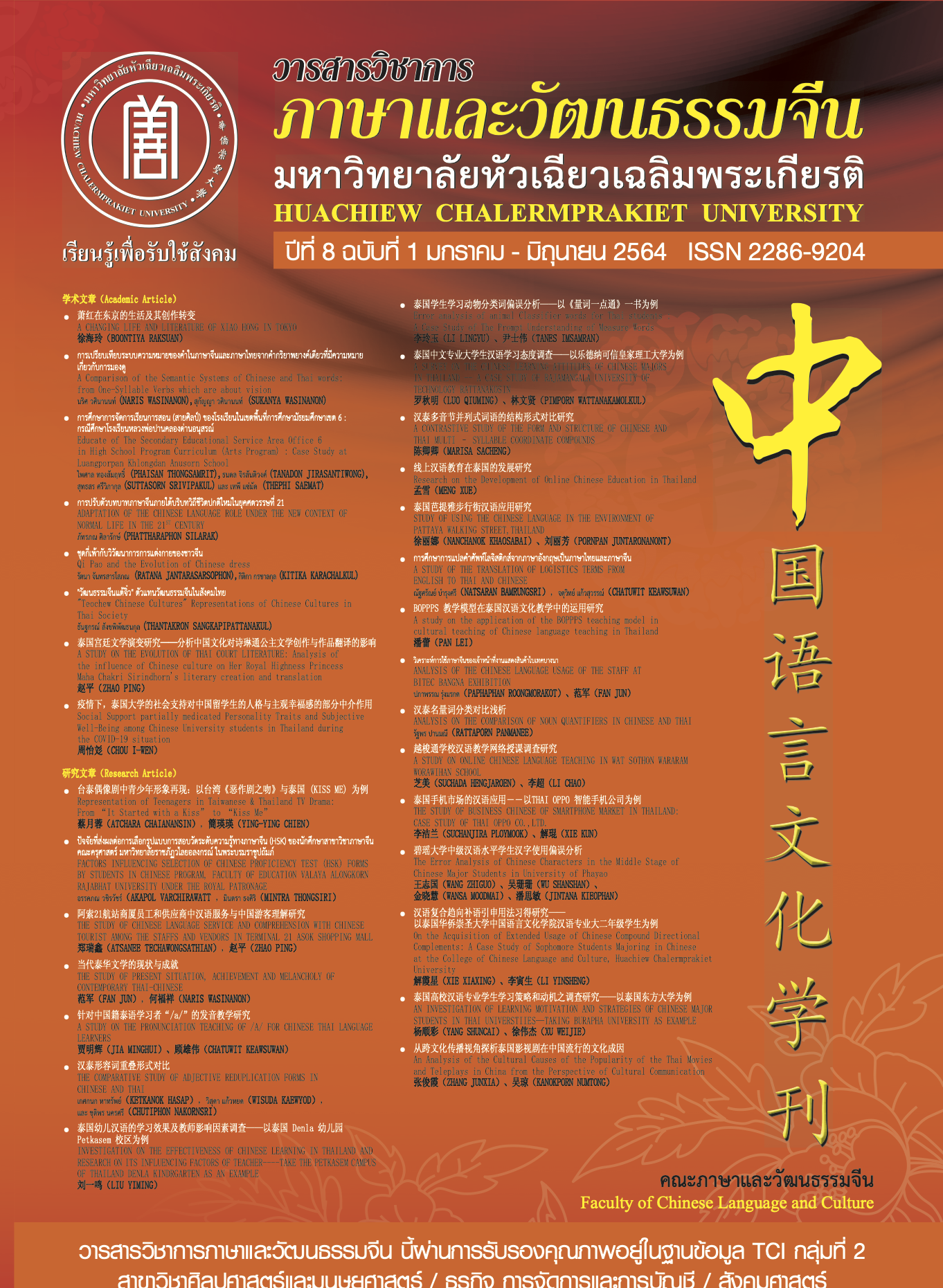Social Support partially medicated Personality Traits and Subjective Well-Being among Chinese University students in Thailand during the COVID-19 situation
Keywords:
Well-being, Significant others, COVID-19, Thai Higher educationAbstract
Thai universities attract more international students, especially Chinese. In the COVID-19 pandemic, Thai education organizations have considered international students' mental fitness. Nevertheless, there is little research in Thailand to investigate the mediation effects of social support (significant others) toward personality characteristics and Subjective well-being in the pandemic era. Thus, this study investigates the mediation impacts from social support (Significant others) linking personality (Extroversion and Neuroticism) to SWB. Participants are 410 International Chinese students from a university in Thailand. Through SPSS 19 to conduct the Reliability and Validity Test, T-Test and one-way ANOVA, and Regression Analysis. The conclusions are:(1) Social support has mediated effects among Chinese University students. Social Support (Significant others) has a significant partial mediating effect on both Extraversion and Neuroticism and Subjective Well-Being; (2) Neuroticism negatively correlated with SWB and Social Support (Significant others); (3) Extraversion is positively correlated with SWB and Social Support (Significant others). (4) Throughout the COVID-19 period, gender and grade do not differ in students' SWB. The study contributes to three main recommendations for Thai higher educational institutes. Based on the results, it presents three valuable recommendations for educational institutions. The Thai educators can reference this study's findings and suggestions.
References
Andrade, M. S., & Evans, N. W. (Eds.). (2009). International Students: Strengthening a Critical Resource Lanham: Rowman & Littlefield Education.
Baron, R. M., & Kenny, D. A. (1986). The moderator–mediator variable distinction in social psychological research: Conceptual, strategic, and statistical considerations. Journal of Personality and Social Psychology, 51, 1173–1182.
Bostic, T. J., & Ptacek, J. T. (2001). Personality factors and the short-term variability in subjective well-being. Journal of Happiness Studies: An Interdisciplinary Forum on Subjective Well-Being, 2(4), 355-373.
Correa T., Hinsley A.W., De Zuniga H.G. (2010) .Who interacts on the Web?: the intersection of users' personality and social media use, Computers in Human Behavior, 26 (2) , 247-253.
Caci B. , Miceli S. , Scrima F. & Cardaci M. (2020). Neuroticism and Fear of COVID-19. The Interplay Between Boredom, Fantasy Engagement, and Perceived Control Over Time. Front. Psychol. 11:574393. doi:10.3389/fpsyg.2020.57439
Chou, I. W. (2020). The effect of Behavioral Cultural Intelligence, Personality and Academic Performance on Perceived Well-Being among International Chinese College Students in Thailand. Chinese Journal of Social Science and Management, 4(2) ,126-136. [in Chinese]
Chu, P. S., Saucier, D. A., & Hafner, E. (2010). Meta-Analysis of the Relationships between Perceived Social Support and Well-Being in Children and Adolescents. Journal of Social and Clinical Psychology, 29(6), 624-645. http://dx.doi.org/10.1521/jscp.2010.29.6.624
DeVellis, R. F. (1991). Applied social research methods series, Vol. 26. Scale development: Theory and applications. Sage Publications, Inc.
Fornell, C., & Larcker, D. F. (1981). Evaluating structural equation models with unobservable variables and measurement error. Journal of Marketing Research, 18(1), 39–50. https://doi.org/10.2307/3151312
Goldberg, L. R. (1990). An alternative "description of personality": The Big-Five factor structure. Journal of Personality and Social Psychology, 59(6), 1216–1229. https://doi.org/10.1037/0022-3514.59.6.1216
Kaiser, H. (1974). An index of factorial simplicity. Psychometrika, 39: 31-36.
Lin, C. C. (2014). Exploring the relationships among gratitude, social support, and well-being: a test of a mediated-effects model. Formosa Journal of Mental Health, 27(3), 453-482.
Lu, L. (1998). The Meaning, Measure, and Correlates of Happiness among Chinese People. Proceedings of the National Science Council: Part C, Humanities and Social Sciences, 8(1), 115-137.
Olson, D. A., & Shultz, K. S. (1994). Gender differences in the dimensionality of social support. Journal of Applied Social Psychology, 24(14), 1221–1232.
Quan, H.Y., Long, F. H., Dong, M, Zhou, H.C., Guo, X.Q., & Liu, H. (2008). The relationship between college students' mental health, personality, and social support, Chinese Journal of Health Psychology, 2, 150-152. [in Chinese]
Ratanasiripong, P. (2012). Mental Health of Muslim Nursing Students in Thailand. International Scholarly Research Network ISRN Nursing, 12 , 1-7.
Stead, H., & Bibby, P. A. (2017). Personality, fear of missing out and problematic internet use and their relationship to subjective well-being. Computers in Human Behavior, 76, 534-540. doi:10.1016/j.chb.2017.08.016
Saltzman, L. Y., Pat-Horenczyk, R., Lombe, M., Weltman, A., Ziv, Y.,McNamara, T. , Takeuchi, D., & Brom, D. (2018). Post-combat adaptation: Improving social support and reaching constructive growth. Anxiety, Stress &Coping: An International Journal, 31(3), 418–430.
United Nations. “Policy Brief: Education during COVID-19 and beyond” [online],(https://www.un.org/development/desa/dspd/wpcontent/uploads/sites/22/2020/08/sg_policy_brief_covid-19_and_education_august_2020.pdf), 2021/2/04
Weiss, R. S. (1973). Loneliness: The experience of emotional and social isolation. Cambridge, MA: MIT Press.
Xu, J., & Ou, L. (2014). Resilience and quality of life among Wenchuan earthquake survivors: The mediating role of Perceived Social Support. Public Health, 128, 430–437. https://doi.org/10.1016/j.puhe.2014.03.002
Zhu Jiani (2016). Chinese Overseas Students and Intercultural Learning Environments. Palgrave Studies on Chinese Education in a Global Perspective. Palgrave MacMillan.
Zimet, G. D., Dahlem, N. W., Zimet, S. G., & Farley, G. K. (1988). The Multidimensional Scale of Perceived Perceived Social Support. Journal of Personality Assessment, 52, 30-41.
Downloads
Published
How to Cite
Issue
Section
License
บทความที่ได้รับการตีพิมพ์เป็นลิขสิทธิ์ของวารสารภาษาและวัฒนธรรมจีน มหาวิทยาลัยหัวเฉียวเฉลิมพระเกียรติ
บทความใน “วารสารวิชาการภาษาและวัฒนธรรมจีน” เป็นทรรศนะของผู้เขียนโดยเฉพาะ กองบรรณาธิการไม่มีส่วนในความคิดเห็นในข้อเขียนเหล่านั้น




